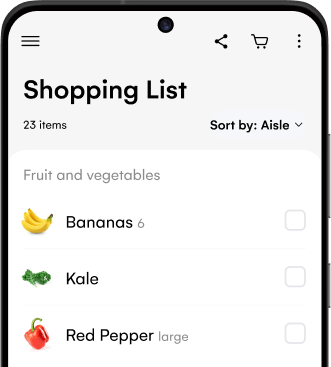Cars can’t run on empty; they need fuel to move. And not just any fuel: you wouldn’t get very far if you put petrol into a diesel engine and vice versa. Think of yourself as a supercar when it comes to exercise and training. That’s right, you’re a Ferrari who needs to be taken care of! Polishing your exterior will undoubtedly help your aesthetics, but for optimum health benefits, you need a robust chassis and a roaring engine. And of course, the right fuel. What you eat before exercising comes into play here if you want to perform at your best.
Analyse nutritional information for any recipe

If you are in a quandary about what type of fuel your engine needs, you have come to the right place. It’s time to rev up your engine with the proper fuel. No more grinding to a stop or running out of power. Consuming the right fuel before exercising will optimize your workouts and energize your whole system.
Enough about cars, let’s talk human fuel for a bit.

Why food is vital for exercising
So, you have an exercise routine and are super consistent and dedicated. That’s brilliant, but have you also considered the role food plays in helping you get fit and healthy? You might have noticed some days your run feels easier than others, or that you struggle less with lightheadedness or fatigue after you’ve eaten oats in the morning.
That’s because your body obtains its energy from the food and drinks you consume. It breaks down primary macronutrients, carbohydrates, fats, and proteins into energy.
Your body uses carbohydrates as its key energy source; once these stores are depleted, it will turn to fat and protein for energy.
There are three energy systems in the body.
- Phosphagen system.
- Glycolytic system.
- Oxidative system.
The methods and efficiency of each energy system vary, but the common thread is that they all aim to produce adenosine triphosphate (ATP), which are units of energy.
Muscle contraction and cell division rely on ATP. Or, put another way, ATP is essential for both using muscles and growing muscles.
Plan ahead and say goodbye to meal time madness

Nutritional needs before exercising
Not all workouts are made equal. An hour of yoga places a different demand on the body than an hour of running or swimming. The type of exercise you’re doing, as well as how long you’re working out for, will both affect your pre-workout fueling.
As a general rule of thumb, use carbohydrates beforehand to fuel your exercise and improve performance. Protein, on the other hand, is best to rebuild and repair muscles after your workout.
Carbohydrates are stored in the muscle and liver in the form of glycogen. These supplies are not endless; your body can only store enough glycogen for 90 – 120 minutes of exercise.
To optimize the effects of your training and increase your performance, consider coordinating your exercise around meal time or taking a snack before exercising to boost your glycogen stores.
Good quality carbohydrates to fuel your exercising include:
- Quinoa.
- Oats.
- Beans.
- Pasta.
- Grains.
- Vegetables.
- Fruit.
What about protein? There’s evidence that you should spread it out throughout the day to optimize muscle recovery and growth. So it makes sense to time your exercise around eating both pre and post workout.
Beware of exercising without eating
Exercising first thing in the morning is a popular choice. But bear in mind your body will be in a fasted state with depleted glycogen stores as your body uses this glycogen to keep you functioning while you sleep.
The science behind exercising fasted has chopped and changed over the years. But according to Dr. Stacy Sims, an exercise physiologist and nutrition scientist, it’s essential to ensure you have some fuel on board before exercising. She suggests even a small protein and carbohydrate snack of 150 calories.
Dr. Sims stresses that fueling before exercise is most important in the mornings when the stress hormone cortisol is already high. Eating before exercise helps reduce cortisol levels, whereas failing to fuel may exacerbate them. The odd fasted exercise session won’t do any harm, but if this becomes a habit, your risk of weight gain, reduced metabolic rate and increased fatigue.

Different ways to meet your body’s needs
You know eating before exercising is important, but sometimes it’s challenging to coordinate exercise and mealtimes.
Here are two ways to boost your glycogen stores to help set your body up for success before exercising.
1. When a substantial meal is essential
This is intensity dependent but usually if your workout is longer than 90 minutes, you will need a proper meal.
For breakfast, consider a bowl of porridge with banana, honey, maple syrup, chia seeds, and a mug of coffee. Or several pieces of toast with peanut butter. A black bean and brown rice burrito will pack a good carbohydrate punch for lunch.
For good reason, these are typical meal choices for triathletes and marathon runners. Beans, rice, oats, and bread are low on the glycaemic index, meaning the energy release is slow. That’s what makes them so perfect for longer exercise durations.
Give yourself at least 30 minutes to digest before starting your exercise session.
2. When you need something smaller
If you exercise for no longer than 90 minutes, consider a convenient grab-and-go option. You may have finished a long day at the office and want to pop to the gym on your way home. Or maybe you have some meditative laps of the pool before your day starts.
Either way, your schedule means you need something light and easy. These situations are where options such as energy bars, protein balls, fruit, and nuts come into play. A word of caution here – be aware of the refined sugar content of energy bars.
The great thing about these small snacks is that they don’t need much time to digest; you can eat and exercise almost immediately. Your body will thank you for the energy boost.

Eat, exercise, rest, repeat
Channel your inner supercar. To find your top gear, what you eat before exercising is a crucial piece of the holistic fitness puzzle.
Remove the burden of meal planning and sign up for Samsung Food recipe recommendations tailored to your preferences like type cuisine, cooking time, dietary restrictions, and more.



